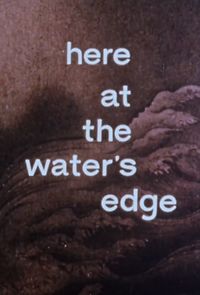Here At The Water's Edge
Genres: Documentary
Country: United States
Director: Leo Hurwitz, Charles Pratt
Actors: N/A
Duration: 57 min
Year: 1961
In five visual stanzas, Leo Hurwitz deftly encapsulates water’s significance to humanity, and links the effects of how water sustains and serves all creatures on this earth. He begins with the ocean lapping foamy waves on a sandy shore and carries the viewer, as if in a dream, deeper into the interior of the land, where rivers flow to meet the sea and where humans have sculpted marshes and wetlands to contain and harness the water’s power. Hurwitz practically captures the clear ocean air and the smell of the salt water, so immediate are his images. There is a simple purity here that diminishes with each new segment. The progression seems inexorable and tragic. Shot along the New York City shore and on the banks of the Hudson and East Rivers, Here at the Water’s Edge is filled with the sights and sounds of one of the busiest ports in the world. Tug boats, ferries, and great ocean liners mingle in the glittering-and increasingly polluted-water. The massive skyscrapers and concrete of the city halt at the waterline in a congestion of piers, some old and rotting, some under construction. The images of industry are neatly juxtaposed with those of children in playgrounds, rimmed by high metal fences and set against the human-made vistas that now edge the rivers. Technology has forever altered the once pure waters and salt marshes that were first seen by Europeans when Henry Hudson’s Half Moon sailed up to what the Lenape (Delaware Indians) called mannahata or “hilly island.” Ever the clear-eyed documentarian, Hurwitz created a powerful and moving document that grows more relevant in the context of climate change and the struggle to control water rights around the world. Hurwitz and Pratt later released a record with the edited version of the soundtrack that can be heard on Smithsonian Folkways Recordings.

Comment